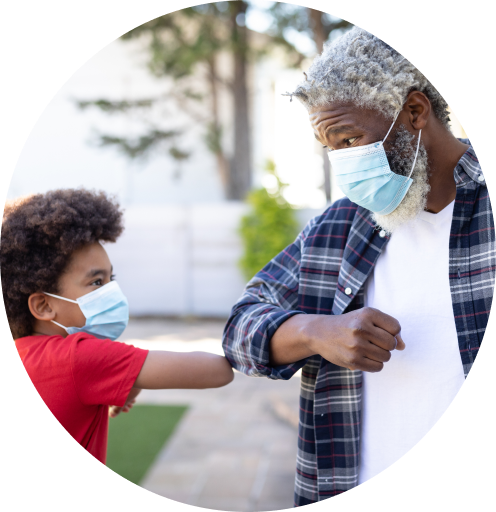Such remarkable scientific achievement was possible due to extensive global research, advances in the fight against cancer and other illnesses, and decades of medical studies. Just like you wouldn’t trust your car repairs to your local butcher because that isn’t their expertise, we know you also wouldn’t trust anyone with your health and wellbeing other than a health care expert. The COVID-19 vaccines passed strict medical safety requirements only after ensuring that the thousands of people from diverse backgrounds - including Black, Indigenous, People of Color, and Latinos - who received them showed they were effective in protecting against COVID-19 with possibly developing minimal side effects.
Your Health, Your Choice:
What You Must Know About the COVID-19
Vaccine and Boosters
Have you found it challenging living in a world with COVID-19?
Are you overwhelmed about your health and how to protect yourself and the ones you love?
According to studies, COVID-19 has been the worst pandemic the world has seen in 100 years. It has traumatized and turned the world upside-down.
You may have lost your job, a friend, a family member, or a neighbor. Yet, you were not able to mourn and grieve your losses. Instead, you found yourself bombarded with messages about what you should and should not do.
At EverThrive Illinois, we are deeply sorry for all you have been through, and we stand beside you.

Caring for yourself, your family, and your community during the pandemic may have been one of the most demanding responsibilities you have faced.
As COVID-19 continues impacting our lives, we are called to adapt and become more educated to make healthy choices for us and those around us. During this ever-changing and challenging time, we want to be Your Champion for Health.
Whether you are a parent or a caregiver, pregnant or recently pregnant, or a community or spiritual leader, we want to offer you our evidence-based information on how you can best protect yourself and others from viruses like COVID-19.
In 2023, the COVID-19 Public Health Emergency will end. This means that the responsibility to cover the cost of COVID-19 vaccines and boosters, testing, and treatment will shift to individuals and their private health insurance companies, Medicare, and Medicaid, as the government will no longer be covering them. It is important to be aware of this transition to make the most informed decisions about your health.
Did you know that we have lived and fought back viruses through vaccines for more than 200 years?
Fighting COVID-19 is not an exception.
Millions of Americans have safely received the COVID-19 vaccine since it became accessible in December 2020. The safety and monitoring of vaccines are continually under review. To view the current total number of COVID-19 vaccinations administered in the United States click here.
The vaccines teach your immune system how to recognize and fight the virus that causes COVID-19. The vaccines never enter where your DNA is stored. Therefore, they do not change or interact with your DNA in any way.
The vaccines do not contain the live virus that causes COVID-19. So, they cannot make you sick with it. If you experience pain in the injection area, body aches, headaches, or fever lasting for a day or two, these are typical symptoms, signs that your body is building protection against the virus.
Whether you have already had COVID-19 or not, getting vaccinated provides greater protection to those around you since they help reduce the spread of the virus. Because no vaccine is 100% effective at preventing illnesses, some fully vaccinated people can still get sick or need to be hospitalized.
The Centers for Disease Control and Prevention (CDC) now recommends that children between the ages of 5 and 11 years receive the Pfizer-BioNTech pediatric COVID-19 Vaccine. Approximately 3,000 children have been part of vaccine trials, ensuring that the vaccine for children is safe and effective. The safety of COVID-19 vaccines is being continuously monitored.
Source
The Takeaways
- COVID-19 vaccines were developed quickly, based on research that has been underway for decades.
- Getting vaccinated is the best way to protect yourself and those you love. While you might experience symptoms, the effects of the virus are much worse.
- COVID-19 vaccines and boosters are available at pharmacies, doctors' offices, and community clinics to everyone 6 months of age and older.
- Your employer may offer time off for you to get vaccinated.
- It is recommended that children and adolescents that are 6 months and older get a COVID-19 vaccine and booster if eligible. Talk to your provider to confirm your child’s eligibility. To learn more about recommended vaccines and boosters, click HERE.
Expecting a baby might be one of the most joyful times in your life. You want to prepare and do your very best to provide, care for, and protect your baby.
Nearly 170,000 pregnant people have received the COVID-19 vaccination in the U.S. without any safety concerns.

-
COVID-19 vaccines protect.
COVID-19 infections contributed to 25% of maternal deaths in 2020 and 2021 (Source). You can protect yourself and your unborn baby from getting the COVID-19 virus by getting vaccinated. The vaccine tells your body to provide antibodies against the virus, which protects you and your baby. When you get vaccinated while breastfeeding, these same antibodies also protect your baby.
-
COVID-19 vaccines are safe
COVID-19 vaccines are safe. Once the vaccine has been injected into your arm, it quickly dissolves while strengthening your immune system to defend you from the virus. The vaccine never reaches your reproductive organs; therefore, it does not affect your natural fertility.
The Takeaways
- Avoiding infection with COVID-19 should be a top priority for pregnant people.
- If you are pregnant, trying to get pregnant, or breastfeeding, experts recommend getting a COVID-19 vaccine.
- The potential risks (severe illness, preterm birth, and death) to you and your baby are much higher if you get sick with COVID-19 than they would be from the vaccine itself.
- Pregnant people with COVID-19 are also at increased risk for preterm birth (delivering the baby earlier than 37 weeks) and might be at increased risk for other poor pregnancy outcomes.
It is essential that you take steps to protect yourself from getting the virus. You can do so by getting a COVID-19 vaccine as soon as you can. You can also talk to your doctor, nurse, or midwife about navigating pregnancy, your birth plan, and how to best cope with stress and anxiety during this pandemic. Do not delay getting emergency medical care if you need it.
As a parent, choosing to vaccinate your child is a very important decision. EverThrive Illinois is here to give you resources that will help you be well informed to make decisions about your child’s COVID-19 vaccination.
Getting vaccinated against COVID-19, including getting boosters, is the best way to protect your child against the harmful effects of COVID-19.

-
As of December 9th, 2022, it is recommended that children 6 months and older who received both doses of either the Pfizer or Moderna COVID-19 vaccines receive the booster two months after the initial shots. The COVID-19 booster shot improves COVID-19 protection that may have decreased following your child’s previous vaccine series. The bivalent or updated COVID-19 booster shot protects against both the original and most recent variants of the COVID-19 virus currently spreading. It is recommended that all children receive their bivalent booster shot. Reach out to your child’s health care provider to determine if your child is eligible.
All vaccines are available to children 6 months and older.
Kids play a role in controlling the spread of COVID-19, so the more people vaccinated will help slow down infection rates, and there will be fewer chances for the virus to turn into a new strain.
Some places, including schools, may require proof of COVID-19 vaccination to attend events or play sports.
Children can develop long-term complications or even death from COVID-19.
Vaccinated kids exposed to COVID-19 don’t need to quarantine and can keep going to school if they have no symptoms.
Centers for Disease Control and Prevention (CDC) recommends that all children stay up to date with their COVID-19 vaccines for their age group, including bivalent boosters. Those who had previously been infected with the COVID-19 virus should still get vaccinated.
Your Tools and Resources:
Like everything we do at Everthrive , we want the content on this page to be a source of information and support. Considering various sources, questioning, challenging the information you consume, and assessing it with experts and those you trust might be the best, most responsible way to understand, face, and overcome this crisis.

- 1006 S Michigan Avenue, Suite 200
Chicago, IL 60605 - Phone: 312.491.8161
- Fax: 312.491.8171
- Email: info@everthriveil.org
- Web: https://www.everthriveil.org/
Helpful Links
Citations
- [1] https://www.cdc.gov
- [2] https://www.cdc.gov/coronavirus/2019-ncov/vaccines/safety/safety-of-vaccines.html
- [3] https://www.webmd.com/vaccines/covid-19-vaccine/video/video-covid-mrna-vaccine
- [4] https://getvaccineanswers.org/question/vaccine-protection
- [5] https://www.healthline.com/health-news/what-is-your-actual-risk-of-getting-covid-19-if-youre-vaccinated
- [6] https://www.cdc.gov/coronavirus/2019-ncov/vaccines/safety/safety-of-vaccines.html
- [7] https://getvaccineanswers.org/question/vaccine-protection#do-the-vaccines-protect-against-the-delta-variant
- [8] https://www.npr.org/2021/09/10/1036023973/covid-19-unvaccinated-deaths-11-times-more-likely
If you are still deciding if you will get the COVID-19 vaccine or booster shot, stop and ask yourself: from the two available options – getting the COVID-19 vaccine/booster shot or not – which one do I want to remember as the one that has benefited me, my family, and my community? Make it the one decision that you would be proud to share and talk about with others.
We are frequently reviewing and updating this information to reflect the most current data available and provided by subject matter experts on the topic of immunization. Last updated, February 2023



